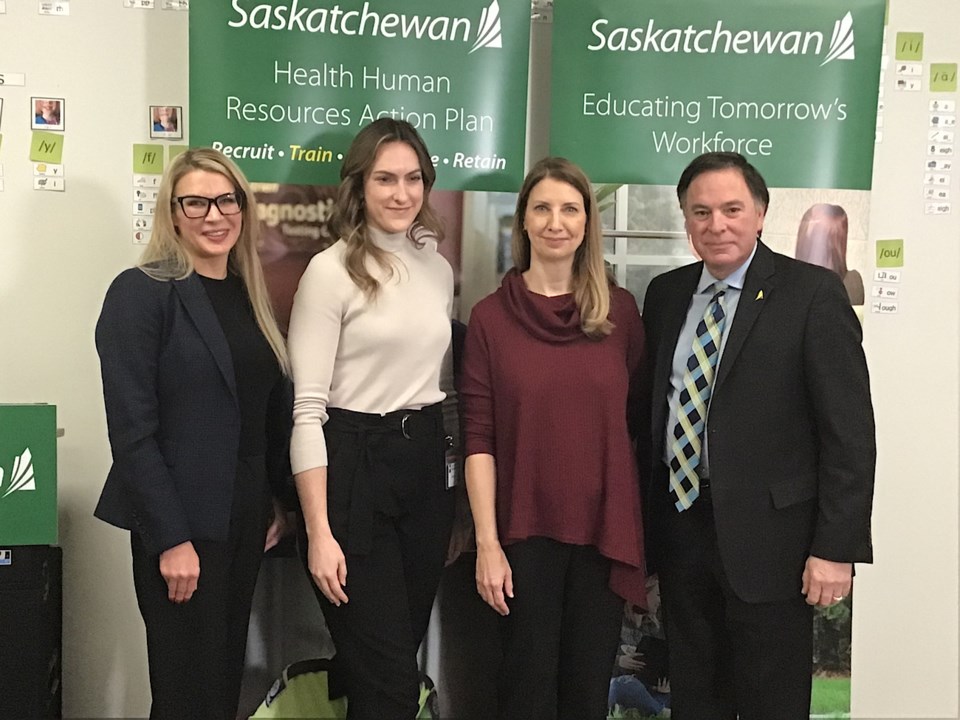REGINA - The provincial government has announced some new or updated interprovincial agreements for Saskatchewan students to be able to access seats in out-of-province health sciences programs.
At an announcement at the Regina Speech Centre on Tuesday, Minister of Advanced Education Gordon Wyant announced the province is investing $5 million to reserve upwards of 149 seats in nine programs outside Saskatchewan. According to the province, these include Cardiovascular Perfusion, Diagnostic Medical Sonography, Electroneurophysiology, Magnetic Resonance Imaging, Nuclear Medicine Technology, Occupational Therapy, Prosthetics and Orthotics, and Respiratory Therapy.
One area that was particularly touted by the province’s announcement Tuesday was a brand new agreement for speech language pathology. Up to 15 seats will be reserved for students in this area, with the students doing their training at the program at the University of Alberta. The province has purchased those seats which will be reserved for Saskatchewan students.
The idea behind the agreements is to offer Saskatchewan students access to specialized training programs currently not offered by the 23 health training programs already in place in the province. The idea is to train Saskatchewan people who can then return home to Saskatchewan to fill much needed positions.
“Interprovincial agreements support the training pillar of the Health Human Resources Action Plan and are critical to supporting health care in Saskatchewan,” Wyant said.
Those Saskatchewan students enroling in programs covered by the interprovincial agreements would be eligible for financial support from the province, including to connect them to careers in Saskatchewan. The province is also providing the clinical placements in Saskatchewan to those students to be able to complete their clinical work.
Wyant said that based on the interprovincial agreements they already have in place, they find that the “return rate is very, very high for students to return to Saskatchewan to work here in Saskatchewan.”
The provincial government says it is exploring the potential to expand the health sciences programs in the province, including such programs as speech language pathology, occupational therapy and respiratory therapy.
“Up until now we haven’t had a training program for speech language pathology, but I can tell you that they are active conversations with the University of Saskatchewan around a speech language pathology program, and a number of other programs where we can provide them right here in Saskatchewan,” said Wyant.
He said they are hoping to be able to provide that program soon. “It would be incumbent on the university to provide us some advice in terms of space allocation, staff allocation, those types of things, but we’ve expressed some significant support for the University of Saskatchewan in developing that course right here in the province.”
Those professionals in the speech language and audiology field welcomed the announcement.
“My time studying at the University of Alberta helped prepare me for a meaningful career right here in Saskatchewan,” said recent graduate of the Speech-Language Pathology program Katelin Peters in a news release.
“Having seats reserved in specialized health care programs means more students will have the opportunity that I did to train for a career that supports patients across Saskatchewan and the health care system as a whole.”
“Speech-Language & Audiology Canada would like to thank the Government of Saskatchewan for their recognition of the importance of investing in additional seats for Saskatchewan students in Speech-Language Pathology; and expanding the scale of Saskatchewan's health training capacity demonstrates the government's commitment to strengthening our health care workforce,” said Speech-Language and Audiology Canada CEO Dawn Wilson in a statement.
“Due to current and future shortages, our members are not adequately able to meet the needs of the population, in particular the growing aging population. Speech-Language Pathologists deliver care across the lifespan and play a vital role in the healthcare system, in both public and private settings."






